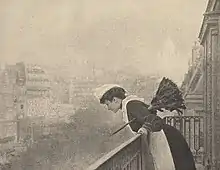French maid
French maid was a term applied in the Victorian and early 20th century periods to a lady's maid of French nationality. A lady’s maid was a senior servant who reported directly to the lady of the house, and accompanied her mistress on travel. She helped her mistress with her appearance, including make-up, hairdressing, clothing, jewellery, and shoes, and sometimes served as confidante. A maid of French nationality was considered likely to be more expert in current fashions, and was also able to apply her knowledge of the French language when travelling in Europe.[1]


Erotic fantasies revolving around young French women later led to the appearance of French maids as desirable and stereotypical soubrette characters in burlesque dramas and bedroom farces.[2]
The term French maid is now often applied to an eroticised and strongly modified style of servant's dress that evolved from typical housemaid's black-and-white afternoon uniforms of 19th-century France, despite a housemaid being junior to a lady’s maid. Some styles are conservative while others are revealing. The French maid costume is often used in cosplay, sexual roleplaying, and uniform fetishism. Depending on design details, some forms can be classified as lingerie.
Costume details
Though not strict to historically accurate uniforms, the French maid outfit has an easily recognizable pattern and black-and white theme that remains the template for other forms of the costume.
The typical French maid costume includes:
- A black dress with white trim, with a full skirt at or above knee length
- White half-apron, usually with ruffle or lace
- A ruffled or lace headpiece
- Long stockings or tights. These can be white or black and vary from design to design
- High heels
- Feather duster
- White or black lace garter
Optional accessories depend on design and context:
- Choker necklace
- Pearls
- Other cleaning equipment
Culture
The outfits are frequently worn to fancy dress or costume parties, and also used in drama/theater.
References
- Lee, Hermione (2007). Edith Wharton. London: Pimlico. p. 524. ISBN 9781845952013. Retrieved 12 June 2020.
- James, Henry. "The Europeans". Project Gutenberg. Retrieved 12 June 2020.